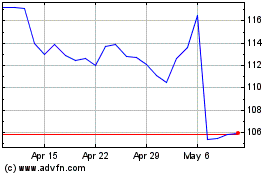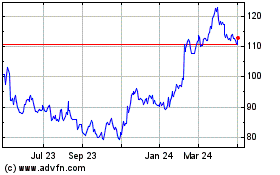By Ben Fritz, Dana Mattioli and Joe Flint
Walt Disney Co. recently held talks to buy some of 21st Century
Fox's cable-television networks, international distribution
operations and movie and television studio, according to people
close to the discussions, a tie-up that would have bolstered
Disney's laggard TV business and allowed Fox to focus on sports,
news and broadcast television.
The talks were no longer active by Monday afternoon when CNBC
first reported them, according to these people. They were very
preliminary and broke down over price and other key deal terms,
according one of them.
Assets Disney would have acquired included the FX cable network,
Twentieth Century Fox studio and Fox's 39% stake in U.K.
pay-television giant Sky PLC.
The talks come as media content and distribution companies have
been rapidly consolidating over the past several years and
consumers embrace new platforms that have established companies
fearful for their futures. Acquiring some of Fox's assets would
have given Disney a leg up in its effort to take more content
directly to consumers, after worries about cord-cutting reducing
subscribers to its key channels, particularly ESPN. For Fox, the
deal could have been a bid to slim down to focus on news and sports
-- content that has traditionally been highly valued by consumers
and advertisers.
The deal would have immediately made Disney the biggest producer
of television content, aiding its struggling television business
and significantly increasing its exposure to foreign markets in
which Fox has a stronger presence. It also would provide additional
content for streaming services Disney is planning to launch in the
next two years.
Not included in the discussion were Fox's broadcast-television
network, local stations, sports channels, Fox News and Fox Business
Network, one of these people said.
Disney views bolstering its television business as a priority.
The unit, driven by ESPN and to a lesser extent by the Disney
Channel and ABC broadcast network, reported an 11% drop in profit
in the nine months ended July 1. The company has been hit hard by
cord-cutting and viewership is down at its family-targeted
channels.
Disney also has less TV business in developing markets than
competitors like Fox, making it more vulnerable to U.S. trends like
declining subscriptions to traditional cable and satellite TV
packages.
Disney Chief Executive Robert Iger in July announced plans to
launch a pair of subscription streaming services to help battle
rivals like Netflix Inc. While the purchase of Fox assets under
discussion wouldn't have affected a planned ESPN offering in 2018,
they could have bolstered a family entertainment offering planned
for 2019 and potentially even give Disney the content to add online
offerings aimed at adults.
Disney has already announced it will end a deal in 2019 to sell
streaming rights to its movies to Netflix, to preserve them for its
own service. That decision will cost Disney more than $300 million,
people with knowledge of the current terms said.
Fox's class A shares closed up 9.9% to $27.45 on news of the
talks Monday afternoon, while Disney stock closed up 2% to
$100.64.
Fox has bid $15.5 billion to buy the rest of Sky to help expand
its global media empire, but the deal has been held up by the U.K.
government as it continues to review whether the acquisition would
put too much power in the hands of one media company.
Fox Executive Chairman Rupert Murdoch has long sought full
control of Sky, in part to further diversity Fox's revenue outside
of North America. He abandoned a previous attempt to buy the
broadcaster in 2011, before his company's split, after a
phone-hacking scandal at one of his U.K. papers -- now shuttered --
triggered widespread political and public outrage.
Mr. Murdoch and his family control about 39% of 21st Century
Fox's class B voting shares. He had spent the past several years
setting up his sons to inherit his media empire. In 2013, he split
his media empire into News Corp, owner of The Wall Street Journal
and other newspapers, and 21st Century Fox, home to much of the
entertainment assets.
Two years later, Mr. Murdoch stepped aside as chief executive of
21st Century Fox and handed the title to his son James Murdoch. His
older son, Lachlan Murdoch, was named executive co-chairman at
Fox.
A sale of assets to Disney would mark a significant reduction in
the size and scope of 21st Century Fox, but it isn't the first time
the family has contemplated a change in structure for the media
company. In 2014, Fox pursued an $89 billion takeover of Time
Warner Inc., the owner of CNN, HBO and Warner Bros. But Fox
abandoned its pursuit after Time Warner rebuffed its advances and
Fox's stock price declined. The deal with Time Warner would have
also combined large movie and television production assets, and
Fox's shares have shown weakness in the more than three years since
its bid, declining about 17% through last week.
Time Warner is now trying to close on a merger with AT&T
that would combine the programming giant with the nation's biggest
pay-TV distributor. Such a combination has other programmers
fearful of losing ways to get their own content to consumers.
This past summer, Discovery Communications Inc. said it was
merging with Scripps Media, creating a behemoth that would own many
of the nation's most popular cable networks. Sinclair Broadcast
Group., one of the nation's biggest owners of local TV stations, is
trying to acquire Tribune Media Co., a deal which would give it a
reach of 70% of the country.
Disney in particular has been worried about shifting consumer
habits as its key channels, particularly ESPN, have lost
subscribers due to cord-cutting. Pay-TV distributors are trying to
create smaller bundles of channels to sell to consumers and
programmers are worried that they might be left out. By combining,
programmers can attempt to use their size as leverage to ensure
that their channels continue to be fully distributed.
Fox owns one of the biggest and most successful TV-production
studios, Twentieth Century Fox Television, which makes shows not
only for its sister Fox broadcast network but also for CBS, NBC and
ABC. Fox-owned shows include the NBC hit "This Is Us," ABC's
"Modern Family" and CBS's "Life in Pieces." Along with Time Warner
Inc.'s Warner Bros. Television, Twentieth Century Fox Television is
one the largest suppliers of content to broadcast and cable
networks. While Disney has a large television production business
as well, it doesn't have the volume of hits that Twentieth Century
Fox Television has.
Fox's entertainment cable networks include FX, which has several
popular shows including "American Horror Story" and "Fargo." It
also owns the National Geographic Channel, which has been investing
heavily in scripted programming although has yet to break through
with any big hits.
Fox's cable channels would have stood out at Disney because they
are known for much more edgy and darker fare, and feature adult
language and push the envelope in terms of nudity as well. Those
channels would have potentially complemented Disney cable networks
such as Freeform and Disney Channel, which are aimed largely at
families, children and young adults.
Keeping the Fox broadcast network and its local television
stations without owning a content machine could complicate the
network's future. The reason Fox was launched some three decades
ago was to ensure its TV studio would have a place to sell
content.
Write to Ben Fritz at ben.fritz@wsj.com, Dana Mattioli at
dana.mattioli@wsj.com and Joe Flint at joe.flint@wsj.com
(END) Dow Jones Newswires
November 06, 2017 16:39 ET (21:39 GMT)
Copyright (c) 2017 Dow Jones & Company, Inc.
Walt Disney (NYSE:DIS)
Historical Stock Chart
From Mar 2024 to Apr 2024

Walt Disney (NYSE:DIS)
Historical Stock Chart
From Apr 2023 to Apr 2024
